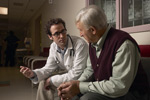WHO ARE YOU Resource Center
Step 1:
WHO ARE YOU?
Step 2:
What the Initiative Means to You
Step 4:
Additional Support Programs

Step 3: Clergy,
Clergy Families and Staff -
YOUR HEALTH/WELLNESS
ASSESSING YOUR HEALTH
The first, and most important step for any individual concerned about their health and the health of their family, is to do an health assessment. Although we have provided an assessment form and links to assessment resources for various areas of your total health, the conference strongly recommends that you involve your family physician in the assessment process.
Just follow the steps in the next section, Healthy Changes, to complete your assessment process before beginning any lifestyle changes. Read more about this valuable resource below.
CONFERENCE WELLNESS RESOURCE FOR INDIVIDUALS: Healthy Changes
Healthy Changes is a resource for individuals that utilizes a step-by-step approach to personal health and wellness, emphasizing the importance of "total health". The four main steps in Healthy Changes, (Understanding Your Total Health, Make the Commitment, Assessment/Goal Setting and the Action Tool Resource Center) give any individual important tools in achieving total health. Resources in the Action Tool Resource center are broken into four main categories:
- Mental / Emotional Health
- Social Health
- Spiritual Health
- Physical Health
You can access the Healthy Changes center from any page on this website by clicking the Healthy Changes icon (Step 3) located in the top menu.
INSPIRATION CORNER

· A national survey of more than 2,500 religious leaders
conducted last year by Pulpit and Pew, a research project on pastoral leadership
based at Duke Divinity School, found that 76 per cent of clergy were either
overweight or obese, compared to 61 per cent of the general population.
· The same study also found that 10 percent of those surveyed reported
being depressed - about the same as the general population - while 40 percent
said they were depressed at times, or worn out "some or most of the
time."
· A survey of Lutheran ministers found that 68 percent were overweight
or obese, while 16 percent of male pastors and 24 percent of female pastors
complained of problems with depression.
